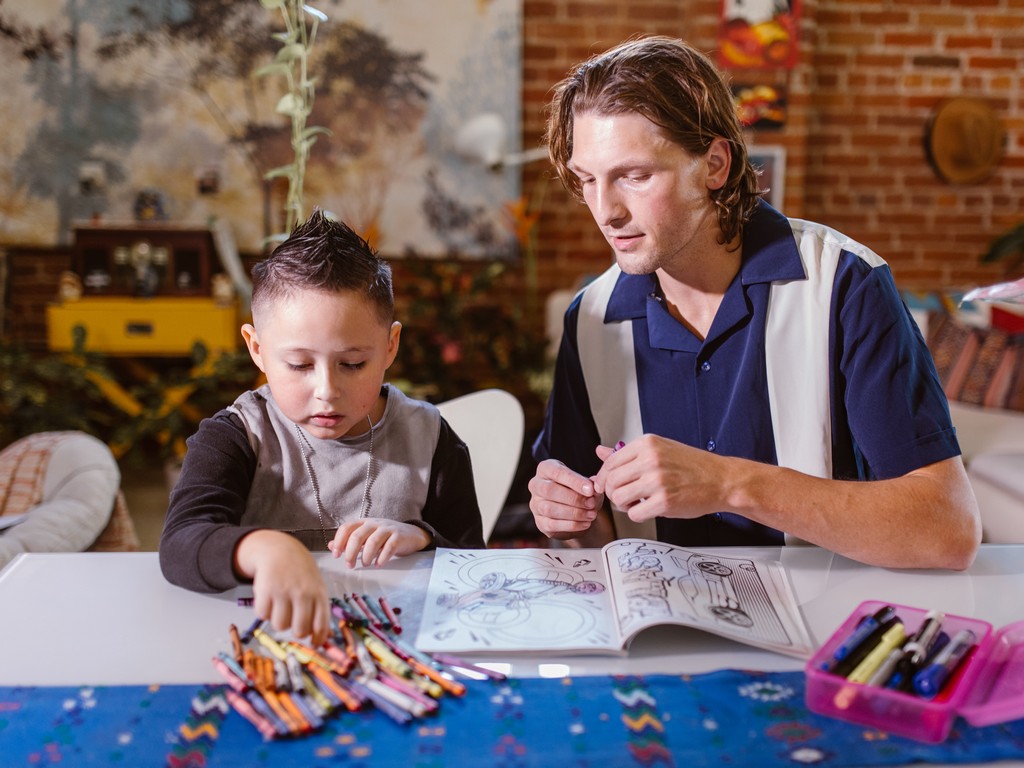The Montessori Curriculum: A Guide to Understanding Montessori Philosophy
The Montessori curriculum is designed to meet the needs of the individual child. It is a child-centered educational approach that emphasizes hands-on learning and discovery. The Montessori curriculum is based on the philosophy of Dr. Maria Montessori, who believed that children are natural learners.
The Montessori curriculum is divided into three areas: practical life, sensorial, and academic. Practical life activities help the child to develop independence, concentration, and coordination. Sensorial activities help the child to develop his or her senses and learn to discriminate between different textures, sounds and smells. Academic activities help the child to develop language skills, mathematical concepts, and scientific knowledge.
The Montessori curriculum is flexible and can be adapted to meet the individual needs of the child. It is important to remember that each child is unique and will progress at his or her own pace. The Montessori curriculum is a guide for understanding the Montessori philosophy and how it can be used to meet the needs of the individual child.
How Montessori Elementary Education Prepares Your Child for Success
Montessori elementary education provides a solid foundation for your child’s future success. The Montessori Method of teaching is based on the philosophy that all children can learn, and that each child learns best in his or her unique way.
In a Montessori classroom, your child will be actively engaged in learning, working with materials and concepts that interest him or her. This hands-on approach to learning helps your child develop a love of learning and provides the perfect foundation for future success.
Your child will also develop important life skills in a Montessori elementary classroom. They will learn to work independently and to think creatively. These skills will be invaluable as your child moves on to middle school, high school, and beyond.
In addition, your child will learn to respect and cooperate with others in a Montessori elementary classroom. The Montessori Method emphasizes collaboration, not competition. This cooperative approach to learning will help your child succeed in any future endeavor, whether it’s in school, in the workplace, or life.
So if you want to give your child the best possible foundation for success, consider enrolling him or her in a Montessori elementary school. With the solid academic foundation and important life skills that your child will gain, they will be well-prepared for whatever the future may hold.
The Advantages of Montessori Middle and High School Education
When it comes to choosing a middle and high school for your children, there are a lot of factors to consider. But if you’re looking for a well-rounded education that will prepare your child for success in college and beyond, a Montessori school might be the right choice.
Montessori schools offer a unique approach to education that emphasizes hands-on learning and individualized attention. This type of education can help your child develop important skills like critical thinking, problem-solving, and independent learning.
Here are some of the other advantages of a Montessori education:
1. Montessori schools offer a challenging and stimulating curriculum.
2. Montessori schools promote independent learning.
3. Montessori schools foster a love of learning.
4. Montessori schools prepare students for success in college and beyond.
5. Montessori schools offer a supportive and nurturing environment.
Montessori vs. Traditional Education: Which is Best for Your Child?
There are a lot of decisions that parents have to make when it comes to their child’s education. One of the biggest decisions is whether to send their child to a traditional school or a Montessori school. Both types of schools have their advantages and disadvantages, so it’s important to understand the difference between them before making a decision.
Here is a comparison of Montessori vs. traditional education:
Montessori Education
Advantages:
1. One of the main advantages of Montessori education is that it emphasizes learning through discovery. This means that children are allowed to explore their environment and learn through hands-on experience.
2. Montessori education also encourages independence and self-motivation. This is because children are given the freedom to choose their activities and work at their own pace.
3. Another advantage of Montessori education is that it takes into account the different learning styles of children. This is because the Montessori method is flexible and can be customized to meet the needs of each child.
4. Finally, Montessori education has been shown to promote creativity, problem-solving skills, and critical thinking.
Disadvantages:
1. One of the main disadvantages of Montessori education is that it can be expensive. This is because Montessori schools are often private schools and they usually require special equipment and materials.
2. Another disadvantage of Montessori education is that it may not be available in your area. This is because there are not as many Montessori schools as there are traditional schools.
3. Montessori education may not be a good fit for every child. This is because some children may thrive in a more structured environment, while others may do better in a less structured environment.
Traditional Education
Advantages:
1. One of the main advantages of traditional education is that it is widely available. This means that you are likely to find a traditional school in your area.
2. Traditional education is usually less expensive than Montessori education. This is because traditional schools are typically public schools and they do not require special equipment or materials.
3. Another advantage of traditional education is that it often provides a more structured environment. This can be beneficial for children who thrive in a more structured setting.
4. Finally, traditional education typically offers a wider range of courses and extracurricular activities. This means that children can explore different interests and find their niche.
Disadvantages:
1. One of the main disadvantages of traditional education is that it can be quite restrictive. This is because traditional schools often have strict rules and regulations that students must follow.
2. Another disadvantage of traditional education is that it often emphasizes rote learning. This means that students are expected to memorize facts and information without necessarily understanding it.
3. Traditional education can also be quite competitive. This is because students are often graded on a curve and comparisons are made between them.
4. Finally, traditional education typically does not take into account the different learning styles of children. This means that some children may not be able to thrive in this type of environment.
Why Montessori Education is the Best Choice for Your Child?
There are many reasons to choose a Montessori education for your child. Montessori is a child-centered educational approach that emphasizes hands-on learning. It is based on the belief that children are natural learners and should be allowed to learn at their own pace in an environment that is designed to meet their individual needs.
Montessori classrooms are typically designed to promote independence, collaboration, and exploration. Materials and activities are often self-directed, and children are encouraged to work at their own pace. This allows children to learn at their pace and to discover their interests.
In addition to the educational benefits, Montessori schools typically have lower teacher-to-child ratios than traditional schools. This allows for more individualized attention and opportunities for one-on-one interaction between teachers and students. Montessori teachers are also trained to observe each child closely and to adapt their teaching methods to meet the needs of each student.
Finally, Montessori schools typically have a strong community feel. Parents are often involved in the school community, and children develop close relationships with their classmates. This supportive environment can provide a sense of belonging and security for children, which can lead to better academic and social outcomes.
How Montessori Learning Materials Enhance Your Child’s Education
As a parent, you want what is best for your child. You want them to have the best education possible so that they can grow up to be successful, happy adults. But how can you be sure that your child is getting the best education possible? One way is to make sure that they are using Montessori learning materials.
Montessori learning materials are designed to help children learn in a way that is natural and effective. They are also designed to be used by children of all ages, so they can be used by your child no matter what stage of their education they are in.
One of the best things about Montessori learning materials
One of the best things about Montessori learning materials is that they are self-correcting. This means that if a child makes a mistake, they will be able to see their mistake and correct it themselves. This is a great way for children to learn because it means that they will be less likely to make the same mistake again.
Another great thing about Montessori learning materials is that they are interactive. This means that children can use them to learn in a way that is hands-on and engaging. This is a great way for children to learn because it allows them to be active participants in their education.
Finally, Montessori learning materials are designed to be used by children of all ages. This means that you can use them with your child no matter what stage of their education they are in. This is a great way for children to learn because it means that they can use the materials no matter what their level of understanding is.
All of these factors make Montessori learning materials an excellent choice for your child’s education. By using these materials, you can be sure that your child is getting the best education possible.

Meet Helen, a passionate educator and Montessori expert with over 15 years of experience in the field. She holds a Bachelor’s degree in Education and a Master’s degree in Montessori Education. Helen’s love for the Montessori method began when she was introduced to it during her own childhood education. Since then, she has dedicated her career to promoting the Montessori approach as a way to help children develop their full potential. Through her work as a teacher, consultant, and writer, Helen has helped countless parents and educators understand and implement the Montessori philosophy in their own lives. Her articles and books have been published in various education journals and she has been invited to speak at conferences around the world. Helen believes that every child has the potential to thrive and that Montessori education provides the tools to make that happen.
